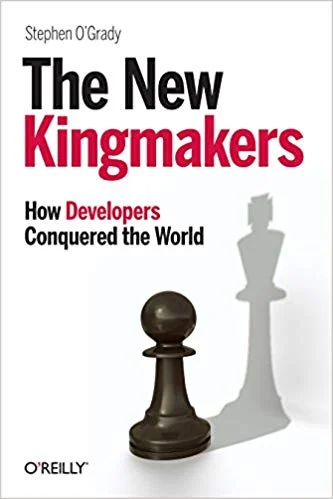Stephen O'Grady's The New Kingmakers is a great book that explains why developers are a business' most important assets. O'Grady says developers are shaping products in new ways, and organizations that understand and embrace the value of this shift will be the most successful in the coming years. He shows how developers today are making the decisions, not the traditional IT decision-makers of prior years. Developers have the power to make or break a business, whether by their experience, their talent, or their passion.

The book quotes legendary CEOs (the kings, to maintain the book's analogy) quantifying developers' value:
- Steve Jobs said that an elite talent was 25 times more valuable to Apple than an average alternative.
- Facebook's Mark Zuckerberg said that someone who is exceptional in their role is not just a little better than someone who is pretty good—they are 100 times better.
- Bill Gates pegged that number at 10,000 times better than the average.
In summary, every business is a software business, and the developers are the most important constituency in it. The developers can make a company great or break it apart. Developers can help a company conquer the world and make new kings (hence the title The New Kingmakers).
The new kingdom builders
We're still in the era of the kingmaker developers, where companies continue their quest to hire the best developers, to engage with them and gain their mindshare and acceptance. The open cloud, open standards, free developer tools, open patents, and open source are just the latest tools in this endeavor. The fact that open source has become ubiquitous indicates how important it is to be accepted by developers.
Even so, I think we're in a new era where developers can conquer the world by creating their own kingdoms. Today, technology allows great developers to challenge established kingdoms, build new kingdoms, and become kings themselves. This technology is the blockchain.
As I wrote previously, "Open source is a collaborative software development and distribution model that allows people with common interests to gather and produce something that no individual can create on their own." It allows the best ideas to spread openly and be implemented collectively. It allows great developers to express their creativity and mastery of a subject. But open source doesn't capture value itself—it produces value, and business models built on top of open source capture the value.
While open source is a value-creation model, blockchain is a value distribution and capture model. Open source is a development time characteristic, whereas blockchain is a software runtime characteristic. Developers that can combine both (not only create but also capture the value with code) can create new kingdoms out of thin air. This is because capturing value is embedded at the core of blockchain-based projects—capturing value is part of the code rather than a distinct model built on top of the code that someone else can monetize.
Open source primarily unites techies in creating something new. But the blockchain model can bring in investors to support great ideas; involve miners (not investors, not users, but a new class of actors in this ecosystem) to run the network nodes; and attract consumers who care about decentralization and transparency. Blockchain brings closure to the end-to-end cycle of building and running software in the open, i.e., from the idea stage to mass consumption.
To be precise, open source is not a prerequisite for capturing value, but it facilitates its creation. Also, other technologies similar to blockchain, such as tangle and hashgraph, follow a similar distribution and value-capture model. Their common characteristic is that capturing and distributing value is embedded in the technology rather than being a separate model.
Here are a few of the pioneer kingdom creators of our time:
- Satoshi Nakamoto wrote the Bitcoin whitepaper. After 10 years, Bitcoin is worth over US$ 100 billion. More importantly, this vision of decentralization gave a spark to many followers.
- Vitalik Buterin founded the Ethereum project, now worth over US$ 1 billion.
- Daniel Larimer created the Steem project, worth over US$ 250 million, and then created EOS, which is valued at close to US$ 5 billion.
- Charles Hoskinson created Cardano, worth over US$ 2 billion.
- Jed McCaleb created the Ripple and Stellar projects, which are worth billions.
These are today's geniuses and visionaries of the blockchain world—the Linus Torvalds of blockchain. But there are many following them, using the platforms created by these geniuses to create new business models and experiment with their own kingdoms. Some will fail, and some will succeed. But clearly, there is a new path for developers to conquer the world—and now it's for real.




1 Comment